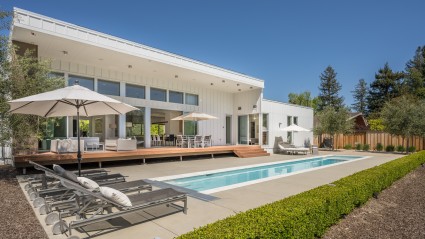Understanding second homes vs. primary residences
Although you might visit a second home for weeks on end, it’s only a personal residence for part of the year. It may be vacant or rented out to others the rest of the time. By contrast, lenders expect your primary residence to take priority because it’s where you live and sleep. You can also own more than one “second” home; a second home is a property secondary to your primary residence.| Feature | Primary residence | Second home |
|---|---|---|
| Occupancy | Where someone lives the majority of the year | Occupied for some portion of the year |
| Mortgage | Lower interest rates | Generally higher interest rates (up to 0.50% higher than primary) |
| Taxes | When you sell, you might not pay capital gains tax on profits if you've lived there for two out of the last five years. | You'll likely pay capital gains tax when you sell |
| Insurance | Standard homeowners insurance policy | Might be more expensive |
| Investment potential | Can appreciate in value, but primarily a living space | Can be rented out for income (if tax rules allow) and there’s a potential for appreciation |
| Example: Alexis and her boyfriend own a house in Detroit, Michigan. Alexis purchases a condo in Florida to enjoy over the winter and holiday weekends. Although Alexis owns two properties, she spends more than 80% of her time in Detroit and uses this address for banking and legal documents. Her primary residence is in Michigan, and her Florida condo is her second home. |
Can you have two primary residences?
Generally, no, you can't have two primary residences at the same time for tax or mortgage purposes. Even if you split your time between a couple of places, only one can be your official "main" home. This is where you spend most of your time, get your mail, register your car and list on official documents. Lenders offer better interest rates on primary residences because they assume you'll always prioritize paying the mortgage on the home where you actually live.Can a second home be a primary residence?
In short, no. A second home cannot be a primary residence because the qualifications of a primary and secondary home are in direct conflict. A primary home is where you spend the majority of your time, and a second home is where you spend a lesser portion of it. Furthermore, understanding the distinctions between a second home vs. an investment property is crucial, since lenders and tax authorities view them differently.Luxury second homes
See allWhy does occupancy status matter?
Your occupancy status matters significantly because it directly influences your financing options, interest rates and how lenders assess risk. Lenders carefully consider how you plan to use a property, as this dictates your financing options. Your primary residence, where you live and sleep, is generally easier to get a mortgage for and typically comes with lower interest rates. Lenders see these loans as less risky, understanding you're highly motivated to keep the roof over your head.Second homes are a different scenario. Although you might visit a second home for weeks, it’s only a personal residence for part of the year. The rest of the time, it may be vacant or rented out to others. These properties typically come with higher interest rates and stricter qualification requirements. You can even use a second home mortgage calculator to estimate potential costs. It’s crucial to be truthful about your intended use when applying for a mortgage, as misrepresenting your occupancy can lead to serious consequences, including your lender demanding immediate full repayment, additional penalties and even bank fraud charges. You can also own more than one "second" home, as it's defined simply as a property secondary to your primary residence.Can you convert a second home into your primary residence?
It's worth noting that a property's occupancy status isn't necessarily permanent; you can change a secondary residence into a primary one if it meets the necessary criteria. For instance, a retired couple might choose to downsize and sell their primary home to make their long-time second home their new primary residence. Since your property's occupancy type directly impacts the specifics of your financing, it's always wise to consult your mortgage lender before making any such changes.| Tip: You'll need to officially update your address with various entities, including your lender and government agencies, and ensure you meet the IRS's "primary residence" qualifications for tax purposes, typically by living there for at least two out of the last five years. |
Make buying a second home simple with Pacaso
Understanding the difference between a primary residence and a second home is important. Knowing the difference helps plan your long-term financial planning, property management responsibilities and even lifestyle choices. For those seeking a luxury second home without the hassle and expense, let Pacaso make it simple with fractional ownership. This allows you to own a share of a high-end property with managed upkeep, which can be an appealing alternative to traditional second home ownership.Primary vs. second homes FAQ
01: How does designating a property as a second home impact its status as a primary residence?
By definition, a primary residence is the dwelling where an individual predominantly resides. Conversely, a second home is typically a supplementary property where one spends limited periods. Due to these distinct categorizations, a second home inherently cannot serve as one's primary residence, as the time allocation and qualifications for each are inherently opposed.
02: What happens if I decide to sell my primary residence or my second home?
The IRS views second homes as investments. Unless you’ve lived in your second home for an extended period of time before the sale (to change occupancy status), you’ll pay long-term capital gains of up to 20% of the property’s value. Selling your primary residence allows capital gains exclusions. Check with your accountant, but you should be able to write off up to $500,000 on your tax return if you’re filing jointly with a spouse.
03: Does the IRS view a Pacaso as a second home?
Your Pacaso is a single-family residence that you own in part as a member of a property-specific LLC. Along with your co-owners, you gain a second home that meets the qualifications outlined earlier (some distance away from your primary residence, occupied for some of the year). Unlike most second homes, Pacaso homes are never rented out. You can rest easy knowing that when you’re not staying at your second home, it’s being well-managed.
04: Can a Pacaso be a primary residence?
Pacaso offers second home co-ownership. Owners are guaranteed to stay at least six weeks out of each calendar year, but no one owner can occupy a Pacaso full-time as a primary residence.



_(1)_(1)-p-2000.jpg/width:425)













